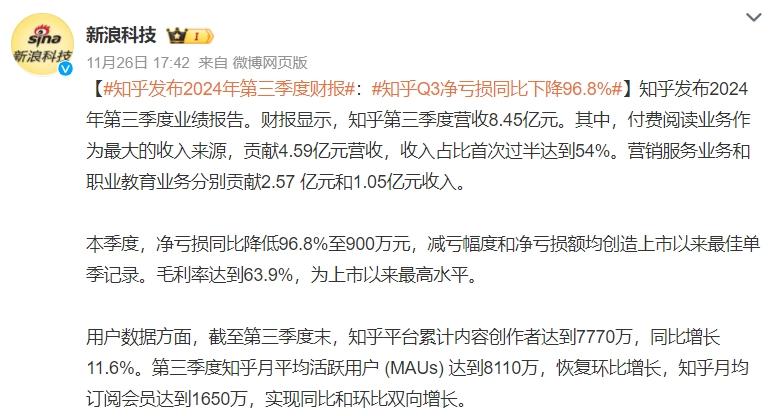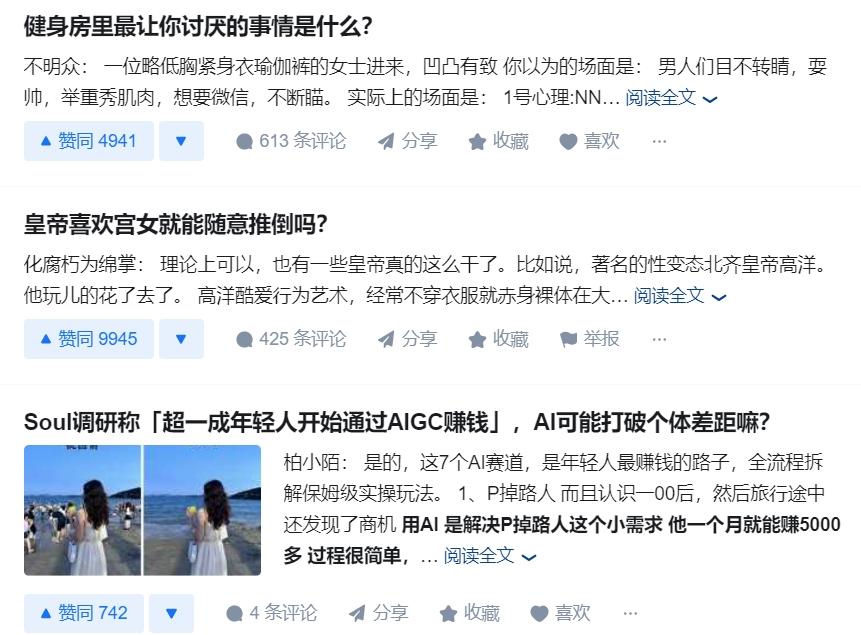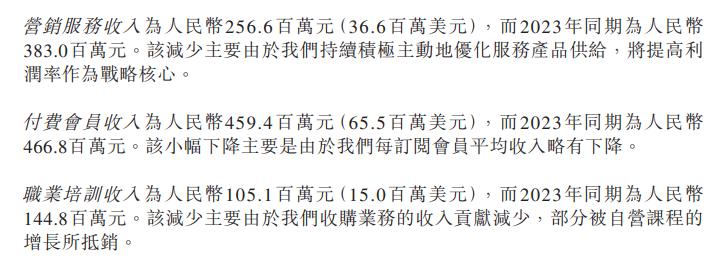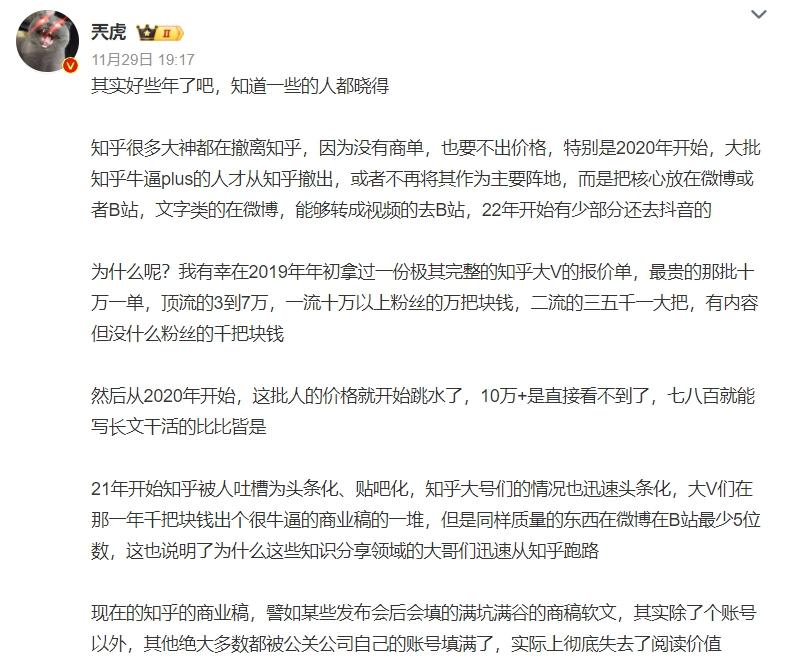When Will Zhihu Achieve 'Joining the Table'?
![]() 12/27 2024
12/27 2024
![]() 704
704
Zhihu must prove that it 'can'.
At the end of 2023, Zhou Yuan set a new year's goal for Zhihu: profitable growth. Achieving 'profitability' became Zhihu's top priority for 2024.
As 2024 draws to a close, how close is Zhihu to its 'profitability' goal?
From the financial data of this year's third quarter, Zhihu (2390.HK) reported revenue of 845 million yuan, a year-on-year decrease of 17.32%. Net losses narrowed by 96.8% year-on-year to 9 million yuan, just 'one step away' from profitability. Despite all main businesses declining year-on-year, Zhihu managed to narrow its quarterly losses through 'cost-cutting' to further achieve its goal set last year of breaking even by the end of 2024.

Image source: Weibo screenshot
However, Zhihu still faces challenges in balancing user growth and content quality, along with the community atmosphere and commercialization. How can Zhihu 'have it all'?
"Fourteen years old, still not profitable." These ten words encapsulate Zhihu's journey.
Fourteen years is no short time for an internet company. Perhaps due to the industry's common understanding that content communities are challenging to monetize, the capital market has shown great patience towards Zhihu.
Investors propelled Zhihu to become a listed company by embracing its 'small but beautiful' narrative, making it the 'first stock of the knowledge community'. However, a 'small but beautiful' entity that cannot generate revenue is merely 'small' without being 'beautiful'; hence, Zhihu embarked on the path of 'commercialization'.

Image source: Stock image library
"In recent years, it's been evident that Zhihu's marketing and lead generation have increased significantly," said Shasha (pseudonym), a 'hardcore' Zhihu user in her 30s. "I've been using Zhihu for almost a decade, and I can clearly feel that its entertainment attributes are growing, while its professional attributes are diminishing." Shasha gave an example, "When I was in college, I started using Zhihu, and it was my 'homework tool' because I studied finance, and there were many detailed breakdowns on Zhihu about writing business analyses. I collected a lot back then."
Later, Shasha found that there were fewer professional topics and answers on Zhihu, and what frequently appeared were controversial topics designed to generate traffic, "such as 'Why are there more and more leftover women?' and 'Should I marry if my boyfriend doesn't give a dowry?'" Shasha said, "These are called 'bait questions' by Zhihu users because they often spark heated discussions due to high social attention."

Image source: Zhihu screenshot
Zhihu became increasingly 'entertaining'. "Who in the entertainment circle has a backer, movie and TV gossip, Zhihu now feels a bit like Douban and Tianya's gossip section," said Shasha. "Moreover, Zhihu's algorithm is very vertical. Once you click on one of these pieces of information, they will dominate what you see when you open Zhihu again."
Many post-00s users, on the other hand, consider Zhihu a 'slacking tool'. Xia Wei (pseudonym), 18 years old this year, said, "Many of my male friends around me browse Zhihu for jokes; I myself also use Zhihu to check hot topics because I don't use Weibo. It seems that people don't really consider Zhihu as a professional knowledge community platform anymore."
For content communities, balancing the community atmosphere and breaking out of the niche seems an impossible task. The original intention of breaking out of the niche is to expand the user base, allowing for screening more high-quality users for monetization. However, blindly pursuing high traffic does not necessarily attract monetizable quality users.

Image source: Weibo screenshot
Looking at the paid user business in the third quarter of 2024, the average monthly subscription membership was 16.5 million, an 11.49% year-on-year increase from 14.8 million members in the same period last year. However, paid membership revenue declined slightly compared to the 467 million yuan in the same period last year, primarily due to a decline in the average price per member.
This is a clear signal that breaking out of the niche brings more traffic, but the inability to guarantee content quality will also affect users' willingness to pay and reduce it.
Many long-time users even complain that Zhihu has turned into a 'story collection'. "There are always novel tweets under serious questions," said one user. "I remember once I was reading a question about dream interpretation, and there was a very interesting answer at the beginning, but when I kept reading, I found out it was a novel."

Image source: Xiaohongshu screenshot
To ensure content quality, Zhihu has also implemented corresponding strategies. According to 'Qujiexianshangye', Zhihu is continuously reducing low-quality, untrusted commercial content and innovating and transforming from models and data infrastructure, so that Zhihu's commercialization is built on a more credible mechanism. To this end, Zhihu has adjusted its algorithm goals to encourage more professional, in-depth, and authentic content to emerge further within the community; at the same time, it has made significant optimizations for the cold start of high-quality content and continues to enhance creators' experiences in terms of creative tools, product mechanisms, and revenue mechanisms.
Zhihu currently has three main commercialization paths: advertising, training, and membership.
These three commercialization pillars share the same fundamental basis: high-quality users.
However, Zhihu has not done enough on this foundation. In the third quarter, Zhihu had 81.1 million monthly active users, a decrease of 26.6% year-on-year. In comparison, Bilibili had 107 million daily active users and 348 million monthly active users, while Xiaohongshu had approximately 120 million daily active users and over 300 million monthly active users. From the perspective of active user scale alone, Zhihu lags significantly.
The inferior user base has caused Zhihu to feel a bit 'left behind' on all three commercialization paths.

Image source: Zhihu financial report screenshot
Taking the advertising business as an example, Zhihu's marketing service revenue in the third quarter was 257 million yuan, a year-on-year decrease of 33%. Moreover, in terms of scale, Bilibili, which also started with a community culture, achieved advertising revenue of 2.09 billion yuan in the third quarter, which is not on the same level as Zhihu's advertising. Additionally, besides the relatively inferior monthly active user scale, Zhihu's advertising does not have a particularly obvious differentiated advantage.
Furthermore, for a content platform to successfully monetize through advertising, another indispensable factor is creator operations. Good content creators should be given more exposure and monetization opportunities to retain them, attracting high-quality users and advertisers through high-quality content.
However, Zhihu pays more attention to the operation of topics and questions. Under Zhihu's algorithm, creators need to spend a lot of energy consistently producing high-quality, high-traffic content. "You need good questions, good answers, and good positions," said an answerer who shares about the workplace on Zhihu. "The biggest difference between being a blogger on Zhihu and other social media platforms is that Zhihu bloggers are always passive. You have to spend a lot of time competing for good positions for good questions, first occupying the position with a few personalized sentences, and then gradually expanding the content, because the order of answers to a popular question on Zhihu is an important determinant of your reading data."
However, due to Zhihu's recommendation mechanism, highly praised answers that are so painstakingly maintained do not draw much attention to the answerer, making many answerers feel it is not worth it.

Image source: Weibo screenshot
Theoretically, Zhihu's training business should naturally develop into a blogger + knowledge payment route after gathering professionals from various fields, but now Zhihu's training business seems heavily influenced by an 'educational institution style'.
A user who spent 5980 yuan to enroll in the 'Zhixuetang' editing course rated the course as 'not worth it'. Talking about the reason, she said, "I thought the course promoted by Zhihu would be very distinctive, but in reality, the content I learned in class can be found on Bilibili or other websites. Whether it's the course content or subsequent order matching channels, Zhihu didn't provide me with much substantial help. If you're a beginner, I don't recommend it; it's not worth the price."

Image source: Xiaohongshu screenshot
According to 'Qujiexianshangye', Zhihu's vocational training business's primary goal is to improve efficiency, so more resources are being concentrated on advantageous courses and new disciplines, such as AI programming, video editing, writing, etc. However, on social media platforms, many users have complained that Zhihu's paid courses are 'not worth it', 'poor service', or even 'scamming'; on the 'Hei Mao Tou Su' platform, there are over 15,000 complaints containing the search term 'Zhihu', most of which are related to issues with Zhihu Zhixuetang services and automatic renewal of Zhihu memberships.

Image source: Hei Mao Tou Su screenshot
Looking back at Zhihu's three main businesses—marketing advertising, membership subscriptions, and knowledge payments—they are all popular monetization models at present, but Zhihu still 'falls short' in all of them.
How to commercialize content communities has always been a problem.
In the past two years, Tianya Forum, another content community, has frequently been rumored to be shutting down, and Douban has repeatedly attempted to go public unsuccessfully. They were once like Zhihu, gradually losing the 'community' flavor during the process of commercialization and breaking out of the niche; even more regrettable is that 'commercialization' was not fully realized, leading the platform to fail on both fronts.
Now, what should Zhihu do if it also wants to 'have it all'?

Image source: Stock image library
Zhihu still needs to continuously improve content quality and user operations on the path of commercialization and breaking out of the niche. High-quality content is the 'core weapon' of content platforms.
According to Zhihu's third-quarter data, professional, authentic, and in-depth content receives better exposure on Zhihu, with both average posts per high-level creator and per capita page views and positive interactions showing double-digit year-on-year increases; while low-quality content continues to decline. As of the latest data, the exposure of average low-quality content on the recommendation page has decreased by over 40% compared to the beginning of the year, and negative feedback from users has decreased by over 30% compared to the beginning of the year.
"Topicality and quality are not conflicting. Reducing purely sensational 'bait questions' and directing traffic towards content with in-depth thinking is what Zhihu should do," Shasha believes.
Based on high-quality content, Zhihu's advertising business can also seek more vertical and targeted customers. For example, a marketing manager from a cybersecurity company once successfully acquired customers through marketing questions on Zhihu. "We are a ToB enterprise, and we work with engineers in the security business. Neither banner ads nor information flow ads, which are broad-based, are suitable for us. In the end, we chose Zhihu's question operations and invited KOLs to answer. This question had nearly 100,000 views, attracting comments from industry experts and peers, which successfully helped us acquire customers."
In fact, compared to consumer merchants that have already been heavily impacted by video platforms, ToB enterprises and some more professional, vertical merchants are more in line with Zhihu's tone.

Image source: Stock image library
Additionally, Zhihu is focusing on AI deployment. In addition to previously investing in AI companies such as Mianbi Zhineng, Zhihu also released a new AI product, 'Zhihu Zhida', in June this year. Based on creators' real question-and-answer data, this product can generate answers to users' questions. On this basis, the 'Professional Search' function was launched, marking a differentiated exploration further into deep scenarios.
"A good community" can only grow 'good business'. Commercialization and the community are not mutually exclusive. Community platforms naturally connect content, brands, and consumers; creators attract users with content, and the platform then attracts businesses with users.
In the past two years, community platforms such as Xiaohongshu, Depop, and Bilibili have developed rapidly, and content communities have entered the second half of the 'commercialization' exploration; whether Zhihu can make money in the future depends on the core of building and strengthening its content ecosystem and exploring business models based on this that can reinforce Zhihu's high-value brand image and unique user positioning.






